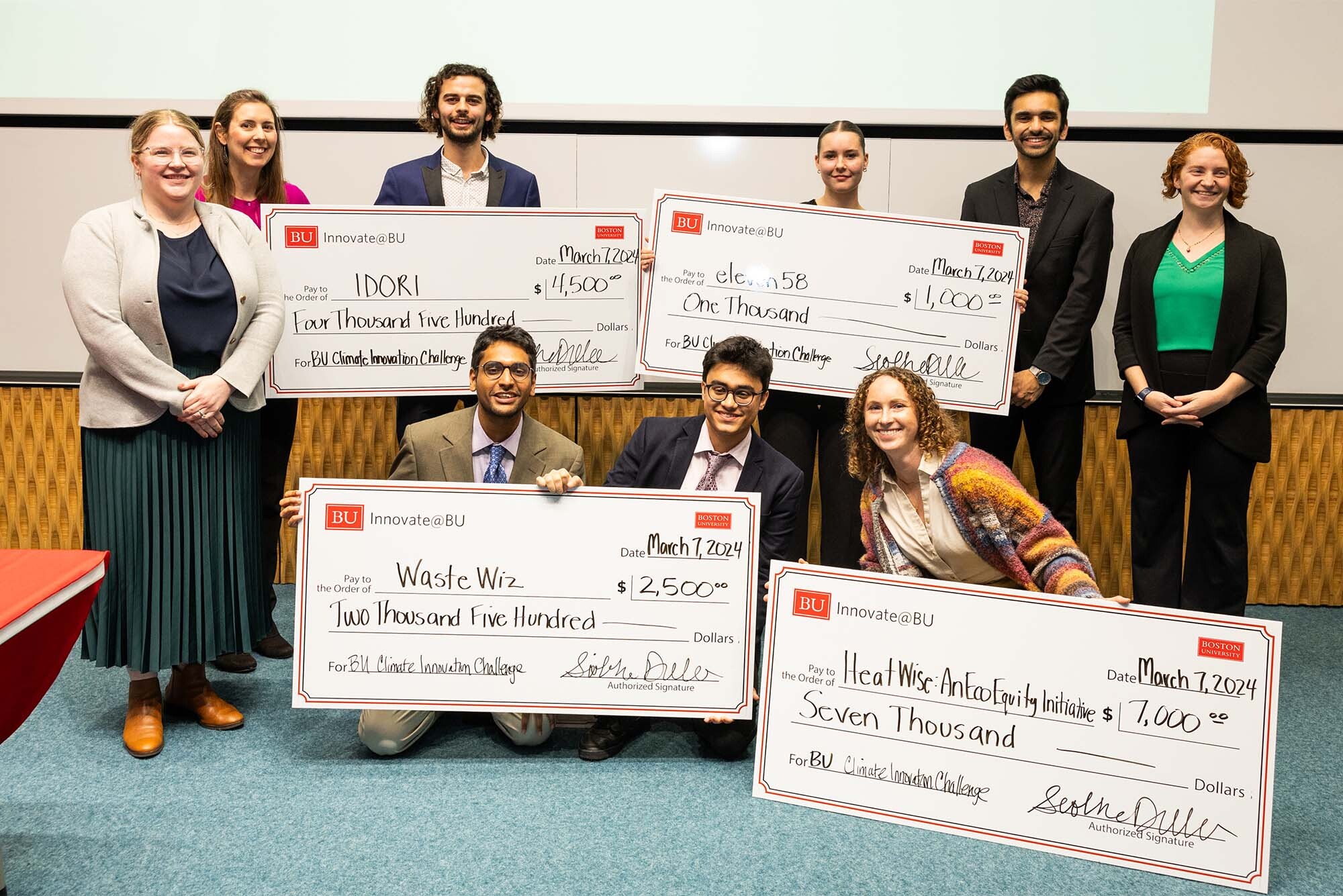Innovate@BU Awarded $15,000 to Students Who Came Up with Ways to Help Boston Face Climate Change
Climate Innovation Challenge Finale also gave applicants coaching, professional development, and networking opportunities with Boston-area nonprofits

Innovate@BU Climate Challenge judges and finalists: (top row, from left) Miriam Posner Harris, Lisa Tornatore (CAS’02), Noah Sorin (Questrom’24), Manon Fretault (Questrom’25), Hessann Farooqi (CAS’22), and Kate England; (bottom row, from left) Rohit Vermparala (GRS’24), Aru Pandey (GRS’24), and Megan Ryder (SPH’25).
Innovate@BU Awarded $15,000 to Students Who Came Up with Ways to Help Boston Face Climate Change
Climate Innovation Challenge Finale also gave applicants coaching, professional development, and networking opportunities with Boston-area nonprofits
In 2016, the City of Boston released Climate Ready Boston, a report detailing the everyday effects of climate change. Since then, the Climate Ready Boston initiative has been working to mitigate these effects through citywide strategies and community collaboration.
And this year, Innovate@BU got involved in the initiative with its Climate Innovation Challenge, which tasked current students and alums from the Class of 2023 to design solutions to help Boston deal with climate change.
To help them develop their solutions, the Climate Innovation Challenge gave applicants access to individual coaching, professional development, and networking opportunities with Boston-area nonprofits. Four finalists were chosen, and on March 7 they presented to a crowd gathered at the Kilachand Center for Integrated Life Sciences & Engineering.
Heatwise EcoEquity Initiative, led by Megan Ryder (SPH’25), took home the first-place prize of $7,000. Heatwise is working to reduce urban heat by planting micro-forests in traditionally disadvantaged areas and fostering community engagement through feedback and educational sessions. “Everyone deserves to benefit from climate health initiatives,” Ryder said. “We want to make sure we are engaging the community and finding a solution together.”
Idori, led by Noah Sorin (Questrom’24), collected the second-place prize of $4,500. This company aims to close the sustainability education gap in young children through interactive and fun activities, like storytelling and plush toys. By beginning environmental education young, and in terms and methods children can understand, Idori strives to reconnect kids with the outdoors. “[We want to] inspire a love for nature and empower them with the tools, knowledge, and skills they need,” Sorin said. “Why don’t we use those resources that kids already love?”
Everyone deserves to benefit from climate health initiatives. We want to make sure we are engaging the community and finding a solution together.
Aru Pandey (CAS’24) and his team pitched WasteWiz and was awarded the third-place prize of $2,500. The company aims to make inefficient recycling a thing of the past through its Spectroscopy-Enhanced Waste Classification System (SEWCS). SEWCS utilizes a sensor to identify materials as recyclable before disposal, which limits contamination in recycling. This also reduces the processing fees from material recovery facilities. “We want to empower [users] through technology and education about what is recyclable and what is not,” Pandey said.
Have you ever seen an AI trash can? Eleven58, which received the fourth-place prize of $1,000, is working on just that. Led by Manon Fretault (Questrom’25), the company is designing a smart trash can that intelligently sorts disposed items using image recognition to recycle correctly. The image recognition model can be processed in real time for easy and accurate disposal. “We are taking away responsibility from the person and putting it on the machine,” Fretault said.

The finalists presented their pitches before a panel of judges, which included Hessann Farooqi (CAS’22), executive director of Boston Climate Action Network, Miriam Posner Harris, executive vice president of the Environmental League of Massachusetts, Kate England, Boston’s director of green infrastructure, and Lisa Tornatore (CAS’02), director of BU Sustainability. Judging is based on several criteria, including a program or product that would tackle an unmet need, a well-thought-out plan, and a solution demonstrating a clear commitment to climate justice.
At the core of the challenge was a shared drive to improve the world. Each team showed passion and forward-thinking in their presentations, coming up with various ways to combat a global issue. It was perhaps said best in the Climate Innovation Challenge application: “We believe that innovation is at its best when it’s fueled by a diversity of thought and backgrounds.”
In addition to Innovate@BU, the Challenge was supported by BU Sustainability, BU Engineering Product Innovation Center (EPIC), BU Spark! BU Initiative on Cities, Earth & Environment Graduate Student Association, and Boston Climate Action Network.
Comments & Discussion
Boston University moderates comments to facilitate an informed, substantive, civil conversation. Abusive, profane, self-promotional, misleading, incoherent or off-topic comments will be rejected. Moderators are staffed during regular business hours (EST) and can only accept comments written in English. Statistics or facts must include a citation or a link to the citation.